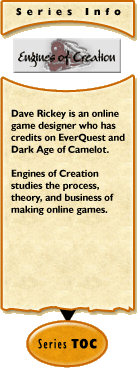
Golden Ghettoby Dave Rickey
Do what'nsoever you want to do with me, Brer Fox, but please, please,
please! Don't throw me in that briar patch 9 months ago, in Age of Discouragement I put out a vision of the future based on Bruce Woodcock's MMOG Subscriptions tracking that indicated 3 to 7 years of strong growth. There's a new version of that chart, and based on it I've decided I was entirely too pessimistic: As near as I can tell, the subscription game market has grown at least 65% in the last year, from 1.5M subs to 2.5M (3M and 100% growth if you count XBox Live, which I don't). This is not the growth of an industry facing imminent hardship, I would now say that we should expect to see strong market growth for a minimum of another 7 years, with 10 years and a total market size of 30M subscribers being the most likely case (and I am starting to suspect that even this is pessimistic and conservative). Break out the sunglasses, the future is painfully bright today. This idea that our industry cannot grow unless we stop making Sci-Fi and Fantasy based worlds and start making something more socially acceptable and mainstream goes way back, but I've never agreed with it. It breaks down on two different grounds: 1) Lord of the Rings, Star Wars, Terminator, Mad Max, Star Trek, Hercules, Xena, Buffy, Charmed....Harry Potter. Geeks stopped living in the ghetto when Bill Gates became the richest man in the world. Today the number one TV show is the irrepresibly geeky CSI, the number one selling book series stars the nerd poster child Harry Potter (and as a children's series, it is defining the aesthetic of an entire generation), typical children are growing up playing collectible card games like Magic: The Gathering. Pokemon, Yu-Gi-Oh, and other undeniably "geeky" pursuits like building their own battle tops (Beyblade) and robots (Lego Mindstorm and Bionicles). This isn't the world we grew up in, geek culture is mainstream. 2) What the hell else could we make? For real-world settings you've got either historical or contemporary options. If they're combat-focused worlds you have only a few historically interesting settings that can be meaningfully differentiated from Fantasy (Wild West, World Wars 1 & 2, a few others). For contemporary and some historical settings, you're treading an ideological and political minefield (imagine a game set in the Civil War....). To really make games that don't center on combat but instead focus on more subtle forms of conflict, we've got a hell of a lot yet to learn, so much we can't even define the problem yet. Let's suppose that only 5% of the population of the US and Europe is ever going to be interested in the games that we know how to make. Let's further suppose that we will not break out of the ghetto, and learn how to make radically different games, for the forseeable future. Let's assume that we won't see any significant change in the business model, and each subscriber will be worth about $225 a year (a $15/month subscription plus one boxed unit per year) Let's go even further and assume that the Asian and US/European markets will continue to be separate markets with little to no crossover. Then our market potential is only somewhere in the neigborhood of 60 *million* subscribtions, and under the current business model that translates into a $15,000,000,000 (15 billion dollars) a year industry employing roughly 75,000-100,000 people. Yeesh, the "Geek Ghetto" looks like a pretty ritzy neighborhood to me. And I think 5% is definitely low-balling when you look at the next generation, that grew up with consoles and PC's as just part of the furniture. Those kids are growing up, and when they have money of their own to spend on social play they aren't going to start bowling and golfing like their parents. When you look at potential refinements of the business model such as exemplified by the online versions of Collectible Card Games and by "pay for stuff" models, and figure that we may be able to extract 2 to 5 times as much money per subscriber, then you have to wonder why, when our industry is undergoing such phenomenal growth while servicing the geek ghetto, are we so concerned about being "stuck" there? We need to stop being embarassed of our games, and start embracing their settings and niches openly. And in fact, the very companies and designers that are decrying the limitations of the "geek ghetto" are making games with stormtroopers and elves and superheroes. Don't throw me into that gold-plated briar patch....
[ <— #20: The Rules | #22: You Keep A'Knocking —> ]
|
